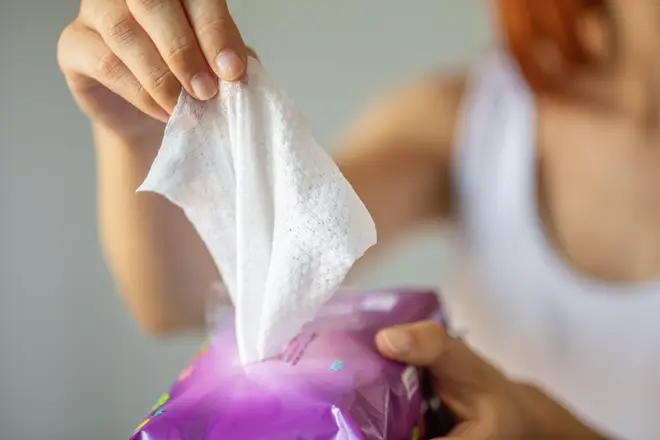
Ben Kentish 10pm - 1am
2 November 2021, 22:55

Wet wipes containing plastic could be banned under proposed new legislation.
MPs have been told the UK needs to ban them because the scale of the problem caused by flushing them "is so big, so damaging and increasing so fast".
Labour MP Fleur Anderson's Plastics (Wet Wipes) Bill to prohibit the manufacture and sale of wet wipes containing plastic had its first reading – the first of 11 stages it must go through before it can become law – in the House of Commons today.
MPs also heard that marine animals are dying, "wet wipe islands" are appearing, and rivers are changing shape because of flushed wipes.

Meanwhile Britons might be eating a "credit card's worth of plastic" due to microplastic shards from the discarded hygiene products, it has been warned.
"As a mother of four children I have used a lot of wet wipes and I completely understand the pressures that parents are under and how useful wet wipes are," said Putney MP Ms Anderson.
"I know that parents also want to do the right thing for the environment."
But she added that 90% of the 11 billion wet wipes used in the UK each year contain some form of plastic which, when broken down, turn into microplastics which can be ingested by wildlife and enter the food chain and water supply.

LBC explains what's happened so far at the COP26 climate summit
She added that the problem was growing, with the Great British Beach Clean reportedly seeing an increase from 1.7 wet wipes per average 100m of beach to 18 wet wipes between 2005 and 2020.
Ms Anderson told the Commons: "When these plastics enter our local marine environment and water systems in such large volumes the damage is absolutely devastating. Globally, a hundred million animals die each year from plastic waste alone."
She also cited data from the World Wildlife Fund, which suggested people eat about five grams of plastic a week, which she described as "literally eating a credit card's worth of plastic every week", claiming wet wipes were a "huge cause of this".
The MP added that wet wipes are the cause of 93% of blockages in UK sewers.
Read more: COP26: Dozens of countries sign up to slash methane emissions
She told the Commons: "Every year water companies spend £100m dealing with the 300,000 sewer blockages, money that is then added to consumer bills, to our bills. This is costing us as well as costing the environment."
The MP told of a recent visit to the Thames where huge piles of wet wipes on the river banks had changed how it flowed, and even described seeing a "wet wipe island" in the river.
She said brands such as Holland and Barrett and The Body Shop had already committed to selling only plastic-free wipes, which are usually made with bamboo or other plant fibres.
She said a "greater scale of production" of plastic-free wipes could be encouraged by the ban, making the alternative cheaper.

Brits will be turned off by green transition once see cost
"We need legislation because the scale of the problem is so big, so damaging and increasing so fast," said Ms Anderson.
"If you ask any marine conservationist, any water operator, any engineer cleaning a fatberg, any volunteer clearing up sludge from our rivers, they will tell you we simply cannot afford to wait for the industry to catch up."
The Plastics (Wet Wipes) Bill will be considered again on 19 November.
As a Private Members' Bill it is unlikely to become law without government support, although Downing Street has signalled it is committed to ending "the throwaway culture".
A spokesman said the 25-year environment plan sets out "a commitment to eliminate avoidable plastic waste".
"We are working closely with the manufacturers and water companies to ensure labelling is clear on wet wipes and also raising awareness on how to dispose of them properly," the spokesman said.
"We are bringing in new powers for ministers to introduce charges on all single-use items, not just plastics, helping to cut waste and put an end to the throwaway culture."